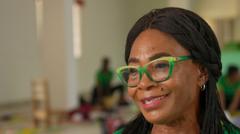In Nigeria, the story of Babatunde Fashola, affectionately called Baba, brings into focus the broader issues facing children affected by cerebral palsy, a neurological disorder often resulting from untreated neonatal jaundice. At 22 years old, Baba stands at just 70cm (2ft 4in) tall, requiring total care due to his inability to speak or walk. After being abandoned as an infant, he found a home at the Cerebral Palsy Centre in Lagos, established by single mother Nonye Nweke.
With insufficient official data, it is reported that Nigeria harbors one of the highest incidences of cerebral palsy in the world, primarily due to complications from neonatal jaundice. Professor Chinyere Ezeaka of Lagos University Teaching Hospital explains that while jaundice affects more than 60% of newborns, timely treatment – often involving exposure to UV light – is essential. However, limited access to this critical care means that many newborns are at risk of long-term neurological damage.
Nweke founded her center out of personal struggle after discovering her daughter, Zimuzo, had cerebral palsy. Initially turned away from care facilities due to widespread stigma, she decided to create a supportive environment for other affected families. The Cerebral Palsy Centre currently supports 12 children in need, but it operates under significant financial strain, dependent solely on donations. With a considerable waiting list, expansion poses a challenge amid Nigeria’s modest economic realities.
Caring for a child with cerebral palsy is not only emotionally taxing but also costly, with monthly expenses reaching USD 1,000. Nweke reflects on her challenges, including the feeling of isolation from other mothers whose children reach typical developmental milestones while her daughter requires constant care.
Despite the hurdles, efforts are underway to improve healthcare for newborns at risk for jaundice. The Oscar Project, a charity initiative in Lagos, aims to enhance the detection and treatment of neonatal jaundice, employing training for healthcare professionals. Named after Oscar Anderson, a disability advocate who dealt with the ramifications of untreated jaundice, the program aspires to provide equipment for hospitals and screening for newborns.
Anderson, now 22, echoes the sentiment of community empowerment, striving to ensure that babies diagnosed with jaundice receive timely interventions to avert long-term disabilities. While the Nigerian government remains relatively quiet on this issue, the collaborative efforts of healthcare professionals and community advocates ignite a beacon of hope, aimed at protecting the nation’s infants from future neurological impairments.
Ultimately, the struggle against neonatal jaundice in Nigeria presents both challenges and opportunities for enhanced medical care, driven by the passionate resolve of individuals like Nonye Nweke and organizations like Project Oscar. The aim is clear: prevent suffering and provide better outcomes for vulnerable children, transforming awareness into action for a healthier future.


















